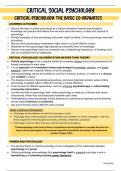LEARNING OUTCOMES
▻ Discuss the idea of critical psychology as a critical orientation towards psychological
knowledge and practice that affects how we think about the theory, context and practice of
psychology.
▻ Provide examples of how psychology and power might be linked, of how psychology may itself
be political.
▻ Discuss what psychological imperialism might mean in a South African context.
▻ Elaborate on how psychology might operate as a powerful form of knowledge.
▻ Discuss how psychology works as a powerful way of depoliticing experience, of knowing one's
self, as a powerful form of subjectivity.
CRITICAL PSYCHOLOGY AS ORIENTATION RATHER THAN THEORY
• Critical psychology is not a singular entity but comprises various forms and perspectives, all
loosely connected to each other.
• It is an approach and orientation toward psychological knowledge, practice, and power
relations, rather than a specific theory or set of concepts.
• Critical psychology cannot be confined to one form of theory, practice, or context; it is diverse
and multiple in nature.
• The diverse concerns, theoretical perspectives, and socio-historical contexts where critical
psychology is applied make it difficult to provide a simple definition.
• It can be seen in different applications, such as critiquing psychotherapy or reformulating
community intervention.
• Just like the field of psychology itself, critical psychology is made up of diverse and varied
components, which may not necessarily resemble each other.
• Understanding critical psychology is best achieved by examining its agendas and functioning
across various theories and practices.
• Has some themes across different areas of study.
WHAT IS CRITICAL PSYCHOLOGY?
⇒ Challenges the foundations on which the discipline is built.
⇒ Psychology lacks understanding of social and historical conditions in which it emerged – and how
these shaped the entire discipline (concepts, methods, institutions, practices)
⇒ Psychology is built on ideas that were relevant during its emergence.
“Critical psychology is the study of forms of surveillance and self-regulation in everyday life and in the
ways in which psychological culture operates beyond the boundaries of academic and professional
practice” (Parker, 2007)
POWER AND PSYCHOLOGY
• The primary theme in critical psychology is the investigation of the relationship between
psychology and power.
• Critical psychology acknowledges that psychology itself is powerful and plays a role in
maintaining and extending existing power dynamics.
TJW NOTES
, • Psychology is seen as a political tool and an instrument of power, both potentially oppressive
and enabling for progressive politics.
• When referring to psychology as political, it encompasses relationships of control, authority,
and subordination rather than just governmental politics.
• Critical psychology emphasizes that psychology's involvement in politics is not arbitrary; it is
always profoundly political, even in everyday and mundane forms.
• Every aspect of psychology, whether as knowledge or practice, generates relationships of
power and is ideologically biased, marginalizing certain perspectives and colluding with
larger structures of power.
• Critical psychology recognizes that psychology is not a neutral science but intrinsically tied to
power dynamics, motivating efforts to critique and disrupt imbalances of power.
WHAT IS THE RELATIONSHIP BETWEEN PSYCHOLOGY AND POWER?
⇒ How psychologists relate to their subjects.
⇒ The knowledge produced by psychology.
⇒ Psychology is not a neutral “science”.
⇒ There is no psychology that does not create or sustain a relationship of power.
Psychological knowledge, psychological expertise and practice always constitute a power relationship
of some sort or another.
PSYCHOLOGY AS IDEOLOGICAL
• Critical psychology emphasizes the political nature of psychology, while mainstream
practices and applications of psychology have historically downplayed this aspect.
• The avoidance of political questions and power-related issues in psychology points to the
ideological functioning of power.
• Ideology in this context refers to how meaning serves to create and sustain relations of
power and domination.
• The second theme in critical psychology is the awareness that psychology operates in
ideological ways that have been largely overlooked in traditional psychology.
• Psychology has omitted ideology as a significant area of study, and its own inherent political
nature remains unacknowledged.
• There are two possible ways of addressing the issue of ideology in psychology:
→ One is critical, focusing on questioning and challenging ideological aspects.
→ While the other is substantive, focusing on the content and beliefs of ideologies within
psychology.
• Critical psychology has two dimensions: the critical dimension and the substantive
dimension.
→ The critical dimension focuses on interrogating psychology as a particular politics of
knowledge, questioning its ideological aspects.
→ The substantive dimension examines the theoretical and formal constitution of the
subject of psychological theory and research, viewing psychology as a particular
politics of subjectivity.
• The third theme in critical psychology is the understanding of critical psychology as both a
politics of knowledge and a politics of subjectivity.
• It involves questioning the ideological nature of psychology while also considering how it
shapes and influences the understanding of human subjectivity.
⤷ We can critique it in terms of its status as a “science”.
⤷ As well as the practices that it uses upon individuals.
TJW NOTES





